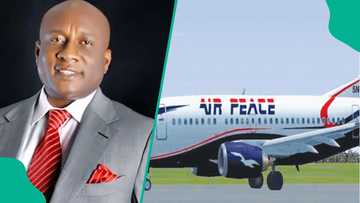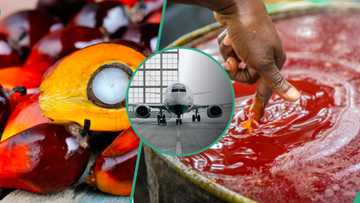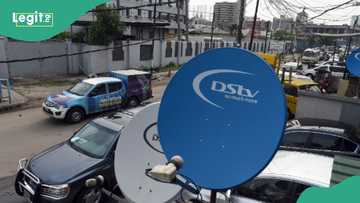Soaring Prices Push Nigerians to Ditch 'Tokunbo' Cars for Local Alternatives, New Rates Emerge
- Findings show that the Nigerian used car market is at an all-time high, as most Nigerians can no longer afford imported vehicles
- They disclosed that the exchange rate and Customs rate are pushing more Nigerians to patronise locally used cars
- The days of foreign-used vehicles, known affectionately as "Tokunbo", being the go-to for many Nigerians are quickly becoming a memory
Legit.ng’s Pascal Oparada has reported on tech, energy, stocks, investment and the economy for over a decade.
A perfect storm of economic pressures, including a depreciating naira, soaring living costs, and new import tariffs, is making these imported cars a luxury few can afford.
This trend is not just changing the landscape of the Nigerian auto market; it's creating a new economic reality where locally-used cars are king, and a surprising new group of buyers is emerging.

Source: Getty Images
A financial squeeze: The price of a tokunbo
For years, a foreign-used car represented a reliable, affordable option for many Nigerians.
But that is no longer the case. According to car dealer Nurudeen Amodu, prices for popular models have skyrocketed.
He notes that a 2003-2006 Toyota Camry that once sold for around N1.5 million now costs as much as N10 million. A Honda CR-V that was N5 million is now priced at N13 million.
These astronomical price hikes are a direct result of the naira’s diminished value against foreign currencies and heavy import duties.
Customs duty drives up imported vehicles’ costs
The recent introduction of a new 4% Free on Board (FOB) levy by the Nigeria Customs Service has only worsened the situation.
While the Customs Service claims this levy, which replaces the old 1% Comprehensive Import Supervision Scheme, is to fund modernisation efforts, licensed customs agents say it’s an increase in the cost of business.
This extra financial burden is passed directly to the consumer, pushing import prices even higher and making vehicles an almost unattainable luxury for the average Nigerian.
The Nigerian used car market takes the driver's seat
As the cost of Tokunbo cars becomes prohibitive, local pre-owned vehicles are experiencing an unprecedented surge in popularity.
Car dealers, once reliant on imports, are now focusing on the thriving domestic market.
Online marketplaces, social media platforms, and roadside lots are seeing a flood of vehicle listings from private owners, as more Nigerians are forced to sell their cars to make ends meet.
According to a Punch report, for some, selling their vehicle is a last resort to cope with financial hardship. Olumide Adegbola, a private car owner, had to sell his Toyota Corolla to provide for his family.
"The economy has really been tough lately. I can’t even afford basic necessities," he lamented. He sold his car for N4 million, twice what he bought it for, just to stay afloat.
Another man, Yunusa, sold his car out of sheer necessity, admitting he lied to a client about travelling to sell it.
He now questions when he'll ever be able to afford another one. This grim reality for many Nigerians is the engine driving the local used car boom.
Cotonou buyers and Nigerien patrols
The economic shift is so profound that it has reversed the typical flow of business.
Nurudeen Amodu, the car dealer, recalls a time when he and other dealers would travel to neighbouring countries like the Benin Republic to buy cars.
Now, the tables have turned. Amodu recently hosted customers from Cotonou who came to buy Nigerian-used cars, stating their currency has more value than the naira.
This trend is even more pronounced in border states like Sokoto, where dealers are seeing an influx of buyers from the Niger Republic.
Car dealer Haruna Abubakar says he now has more customers from Niger than within Nigeria, with buyers purchasing popular models like the Toyota Corolla and Camry.
They are drawn by the better pricing and the relative strength of their currency against the naira. Some even request Nigerian number plates, which their laws permit them to use back home.
This new dynamic is a striking symbol of Nigeria's economic challenges and how they’re impacting regional trade.
Looking inward: The call for local manufacturing
The current crisis has renewed calls for Nigeria to focus on its automotive industry.
Car sellers like Sam argue that local manufacturers must produce vehicles that are affordable and suitable for the average Nigerian.
Similarly, the Association of Motor Dealers of Nigeria (AMDN) is actively working to partner with the National Automotive Design and Development Council to bring this vision to life.

Source: Getty Images
The hope is that a robust local industry can insulate Nigerians from the volatility of exchange rates and import tariffs, providing a sustainable solution for a nation struggling to keep its citizens on the road
10 Tokunbo cars Nigerians can buy under N5 million
Legit.ng earlier reported that as exchange rates fluctuate and inflation accelerates, the used car resale value is rising, making car ownership an asset.
Nigeria’s heavy reliance on imported cars, exchange rate volatility, and inflation has caused a rise in demand for used vehicles.
According to reports, car dealers in Nigeria said that the rising cost of used cars is primarily due to two factors such as exchange rates and import duty charges.
Source: Legit.ng






